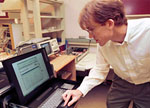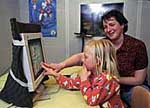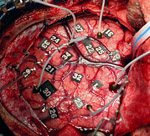Tip sheets highlight timely news and events at Washington University in St. Louis. For more information on any of the stories below or for assistance in arranging interviews, please see the contact information listed with each story.
Scanning all of Shakespeare in 1/60th of a second
System halts computer viruses, worms, before end-user stage

A computer scientist at Washington University in St. Louis has developed technology to stop malicious software – malware – such as viruses and worms long before it even has a chance to reach computers in the home and office. John Lockwood, Ph.D., an assistant professor of computer science at Washington University, and the graduate students that work in his research laboratory have developed a hardware platform called the Field-programmable Port Extender (FPX) that scans for malware transmitted over a network and filters out unwanted data.
Lewis and Clark and Criss, oh my!
200 years later, geologist re-orients Lewis and Clark’s compass readings

Lewis and Clark, meet Robert Criss. Virtual explorer Robert Criss, Ph.D., professor of earth and planetary sciences at Washington University in St. Louis, has teamed up with Lewis and Clark to provide the oldest determinations of the magnetic declination of America’s interior.
‘Red light, green light’; Two minutes instead of an hour
Math technique provides better hearing test for newborns

The marvels of mathematics may open the door to a new, improved hearing test for newborns. A mathematician and doctoral student in electrical engineering at Washington University in St. Louis have devised a hearing test that measures the auditory brainstem response (ABR) twenty times faster than current methodology. The technique allows for testing on small digital machines that takes just two minutes instead of the hour current methods take, and volunteers instead of medical personnel can administer it. This bodes well for mandatory hearing testing of newborns within three years.
Safer brain surgeries
Better brain imaging helps surgeons avoid damage to language functions

Advances in neurosurgery have opened the operating room door for an amazing array of highly invasive forms of brain surgery, but doctors and patients still face an incredibly important decision – whether to operate when life-saving surgery could irrevocably damage a patient’s ability to speak, read or even comprehend a simple conversation. Now, researchers at Washington University in St. Louis are developing a painless, non-invasive imaging technique that surgeons here are using to better evaluate brain surgery risks and to more precisely guide operations so that damage to sensitive language areas is avoided. The breakthrough could improve odds of success in an increasingly common surgery in which damaged sections of a patient’s temporal brain lobe are removed in an effort to alleviate epileptic seizures. November is National Epilepsy Awareness Month.